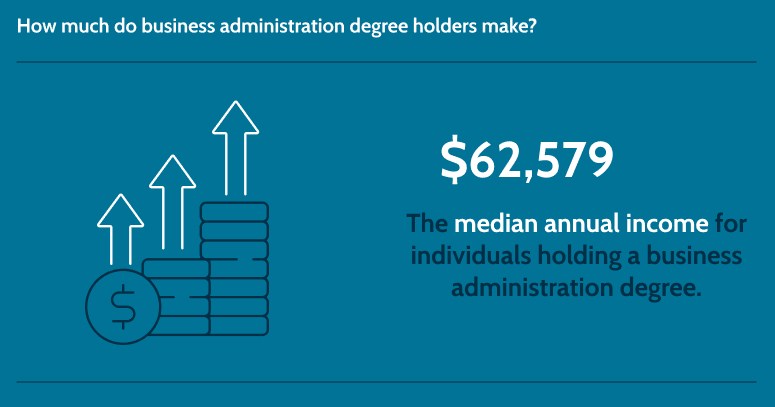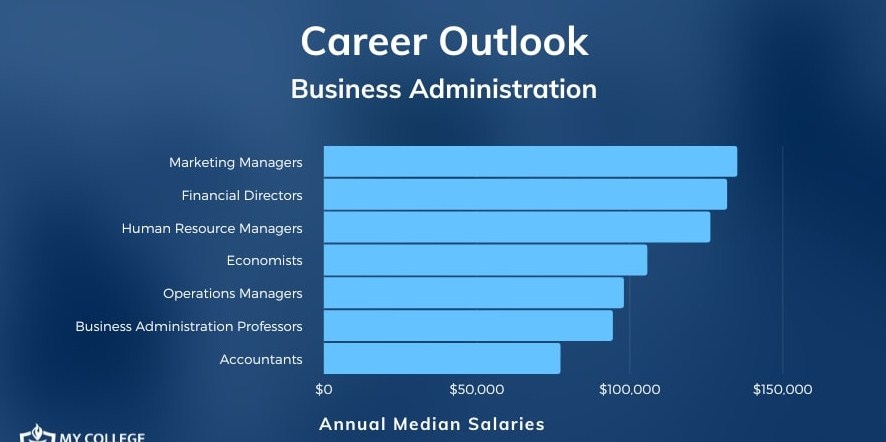Business Administration Degree Salary – A business administration degree is one of the most versatile and in-demand qualifications in the modern job market. Whether you’re interested in management, finance, marketing, or human resources, a business administration degree opens up doors to a variety of career paths. But what about the business administration degree salary? How much can you expect to earn after completing your degree?

In this article, we’ll break down the factors that influence the salary of someone with a business administration degree, the various career opportunities you can pursue, and real-world examples of jobs in this field. Let’s dive deep into the salary expectations and what you need to know about pursuing this degree to maximize your earnings 💰.
1. Understanding the Salary Landscape for Business Administration Graduates
When pursuing a business administration degree, one of the first things that come to mind is the earning potential. The salary you can expect from a business administration degree varies widely depending on several factors:
- Level of Education: Bachelor’s vs. Master’s Degree
- Industry of Employment: Finance, marketing, healthcare, or technology
- Geographic Location: Salary ranges can differ across the country and internationally
- Years of Experience: More experienced professionals can earn higher salaries
- Specialization: A specific focus within business administration, like finance or operations, can impact salary
Salary Overview by Degree Level:
| Degree Level | Average Salary (Per Year) |
|---|---|
| Bachelor’s Degree | $55,000 – $75,000 |
| Master’s Degree (MBA) | $85,000 – $120,000 |
As you can see, obtaining a higher-level degree, such as an MBA, can significantly increase your earning potential. However, even with a bachelor’s degree, the salary is still quite lucrative.
Factors Affecting Your Salary:
- Experience: Entry-level positions may start at a lower salary, but they can increase significantly with years of experience.
- Industry: Roles in finance and technology often offer higher salaries compared to other fields like marketing or human resources.
- Geography: Salaries in cities like New York, San Francisco, or Chicago are typically higher than in rural areas due to cost of living differences.
2. Benefits of a Business Administration Degree
A business administration degree is not just about salary; it’s about the value it brings to your professional life. Here are some key benefits:
Career Advancement Opportunities
The business administration degree is incredibly versatile and opens the door to numerous career opportunities. Graduates can work in a range of fields, including:
- Corporate Management: Becoming a leader in a major company.
- Entrepreneurship: Starting and running your own business.
- Consulting: Helping companies solve problems and improve efficiency.
- Finance: Managing investments, financial planning, and budgeting.
With a solid foundation in business principles, you’ll have the knowledge to grow within any of these sectors.
High Earning Potential
The degree offers high earning potential, especially with specialized knowledge or an MBA. In addition to a higher base salary, many of these careers offer bonuses, commissions, and other incentives, further increasing your earning power.
3. Real-World Examples of Business Administration Careers & Their Salaries
Let’s take a closer look at real-world examples of careers you can pursue with a business administration degree. These examples highlight key industries, positions, salary ranges, and what you can expect in these roles.

1. Financial Manager
A Financial Manager oversees financial operations within an organization, including budgeting, forecasting, and managing investments.
- Salary: $90,000 – $150,000 annually
- Job Role: Responsible for managing a company’s finances, ensuring they remain profitable, and offering financial guidance to executives.
- Skills Required: Strong knowledge of financial software, risk management, and economic principles.
Learn more about Financial Management here.
2. Marketing Manager
A Marketing Manager develops and executes marketing strategies for a company to drive brand awareness and revenue growth.
- Salary: $70,000 – $130,000 annually
- Job Role: Manages marketing campaigns, oversees digital marketing, and coordinates market research.
- Skills Required: Expertise in digital marketing, content creation, and strategic planning.
Check out more on Marketing Manager roles here.
3. Operations Manager
An Operations Manager ensures that an organization’s day-to-day activities are efficient and effective.
- Salary: $65,000 – $110,000 annually
- Job Role: Manages the operations of a business, including supply chain, inventory, and logistics.
- Skills Required: Strong organizational skills, leadership, and process optimization knowledge.
Discover more about Operations Manager positions here.
4. Human Resources Manager
Human Resources Managers play a vital role in recruiting, training, and maintaining a company’s workforce.
- Salary: $70,000 – $115,000 annually
- Job Role: Manages employee relations, recruitment, and compliance with labor laws.
- Skills Required: Strong communication, leadership, and problem-solving skills.
Learn more about Human Resources careers here.
5. Business Analyst
Business Analysts assess business processes and provide recommendations to improve efficiency.
- Salary: $60,000 – $100,000 annually
- Job Role: Analyzes data, reviews processes, and suggests solutions to improve operational performance.
- Skills Required: Data analysis, critical thinking, and proficiency with software like Excel and SQL.
Get more info on Business Analyst roles here.
Salary Comparison Table:
| Career Title | Salary Range | Key Skills | Pros | Cons |
|---|---|---|---|---|
| Financial Manager | $90,000 – $150,000 | Financial analysis, risk management | High earning potential, job stability | Stressful, long hours |
| Marketing Manager | $70,000 – $130,000 | Digital marketing, content creation | Creative freedom, high demand | Pressure to deliver results |
| Operations Manager | $65,000 – $110,000 | Leadership, process optimization | High job security, well-paying | Long working hours |
| Human Resources Manager | $70,000 – $115,000 | Employee relations, compliance | People-focused, rewarding work | Can be emotionally draining |
| Business Analyst | $60,000 – $100,000 | Data analysis, problem-solving | In-demand job, flexible roles | Requires continuous learning |
4. How to Maximize Your Salary with a Business Administration Degree
To maximize your earning potential, consider the following strategies:
1. Pursue an MBA
An MBA (Master of Business Administration) can significantly boost your salary. According to recent data, individuals with an MBA earn, on average, $25,000 to $40,000 more annually compared to those with just a bachelor’s degree.
2. Specialize in High-Demand Fields
Specializing in areas like finance, technology, or healthcare management can also increase your earning potential due to the demand for expertise in these areas.
3. Gain Experience and Leadership Skills
As you gain more experience and take on leadership roles, your salary will rise accordingly. Many high-paying roles in business administration require proven leadership experience.
5. Where to Buy Resources for Your Business Administration Degree
To start your journey, consider investing in the right educational resources. Here are some options for finding textbooks, online courses, and other tools that can help you succeed:
1. Coursera
- Offers various business administration courses, from introductory to advanced levels.
- Visit Coursera
2. Amazon Books
- Find textbooks, guides, and study materials for business administration.
- Shop Amazon Books
3. Udemy
- Provides affordable online business courses that are great for working professionals.
- Explore Udemy Courses
6. Frequently Asked Questions (FAQ)
1. What is the average salary for someone with a business administration degree?
The average salary for a business administration graduate is around $60,000 – $80,000 annually, depending on experience and industry.
2. Does an MBA increase earning potential?
Yes, obtaining an MBA can increase your salary by $25,000 to $40,000 per year compared to a bachelor’s degree.
3. What are the top industries for business administration graduates?
The top industries include finance, marketing, technology, and healthcare, all of which offer lucrative salaries for business administration graduates.
4. How can I improve my salary with a business administration degree?
You can improve your salary by specializing in high-demand fields, pursuing an MBA, and gaining leadership experience.
5. Where can I find online business administration courses?
You can find business courses on platforms like Coursera, Udemy, and Amazon, offering both free and paid options.
By understanding the salary expectations and benefits of a business administration degree, you’re in a great position to start a lucrative career. Whether you pursue a financial management role, venture into marketing, or run your own business, the opportunities are endless.
Read More >>>
- Study Business Degree Online: The Ultimate Guide to Advancing Your Career
- Certificate IV in Business Management: Unlock Career Growth & Skills | 2025 Guide